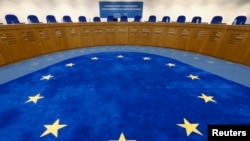STRASBOURG, FRANCE —
Denying that mass killings of Armenians in Ottoman Turkey in 1915 were genocide is not a criminal offense, the European Court of Human Rights ruled on Tuesday in a case involving Switzerland.
The court, which upholds the 47-nation European Convention on Human Rights, said a Swiss law against genocide denial violated the principle of freedom of expression.
The ruling has implications for other European states such as France which have tried to criminalize the refusal to apply the term “genocide” to the massacres of Armenians during the breakup of the Ottoman empire.
A Swiss court had fined the leader of the leftist Turkish Workers' Party, Dogu Perincek, for having branded talk of an Armenian genocide “an international lie” during a 2007 lecture tour in Switzerland.
Turkey accepts that many Armenians died in partisan fighting beginning in 1915 but denies that up to 1.5 million were killed and that it constituted an act of genocide - a term used by many Western historians and foreign parliaments.
“Genocide is a very narrowly defined legal notion which is difficult to prove,” the court said.
“Mr. Perincek was making a speech of a historical, legal and political nature in a contradictory debate.”
The court drew a distinction between the Armenian case and appeals it has rejected against convictions for denying the Nazi German Holocaust against the Jews during World War II.
“In those cases, the plaintiffs had denied sometimes very concrete historical facts such as the existence of gas chambers,” the court said. “They denied crimes committed by the Nazi regime that had a clear legal basis. Furthermore, the facts they denied had been clearly been established by an international tribunal.”
The judges cited a 2012 ruling by France's Constitutional Council which struck down down a law enacted by then President Nicolas Sarkozy's government as “an unconstitutional violation of the right to freedom of speech and communication”.
Switzerland has three months to appeal the ruling.
The court, which upholds the 47-nation European Convention on Human Rights, said a Swiss law against genocide denial violated the principle of freedom of expression.
The ruling has implications for other European states such as France which have tried to criminalize the refusal to apply the term “genocide” to the massacres of Armenians during the breakup of the Ottoman empire.
A Swiss court had fined the leader of the leftist Turkish Workers' Party, Dogu Perincek, for having branded talk of an Armenian genocide “an international lie” during a 2007 lecture tour in Switzerland.
Turkey accepts that many Armenians died in partisan fighting beginning in 1915 but denies that up to 1.5 million were killed and that it constituted an act of genocide - a term used by many Western historians and foreign parliaments.
“Genocide is a very narrowly defined legal notion which is difficult to prove,” the court said.
“Mr. Perincek was making a speech of a historical, legal and political nature in a contradictory debate.”
The court drew a distinction between the Armenian case and appeals it has rejected against convictions for denying the Nazi German Holocaust against the Jews during World War II.
“In those cases, the plaintiffs had denied sometimes very concrete historical facts such as the existence of gas chambers,” the court said. “They denied crimes committed by the Nazi regime that had a clear legal basis. Furthermore, the facts they denied had been clearly been established by an international tribunal.”
The judges cited a 2012 ruling by France's Constitutional Council which struck down down a law enacted by then President Nicolas Sarkozy's government as “an unconstitutional violation of the right to freedom of speech and communication”.
Switzerland has three months to appeal the ruling.





